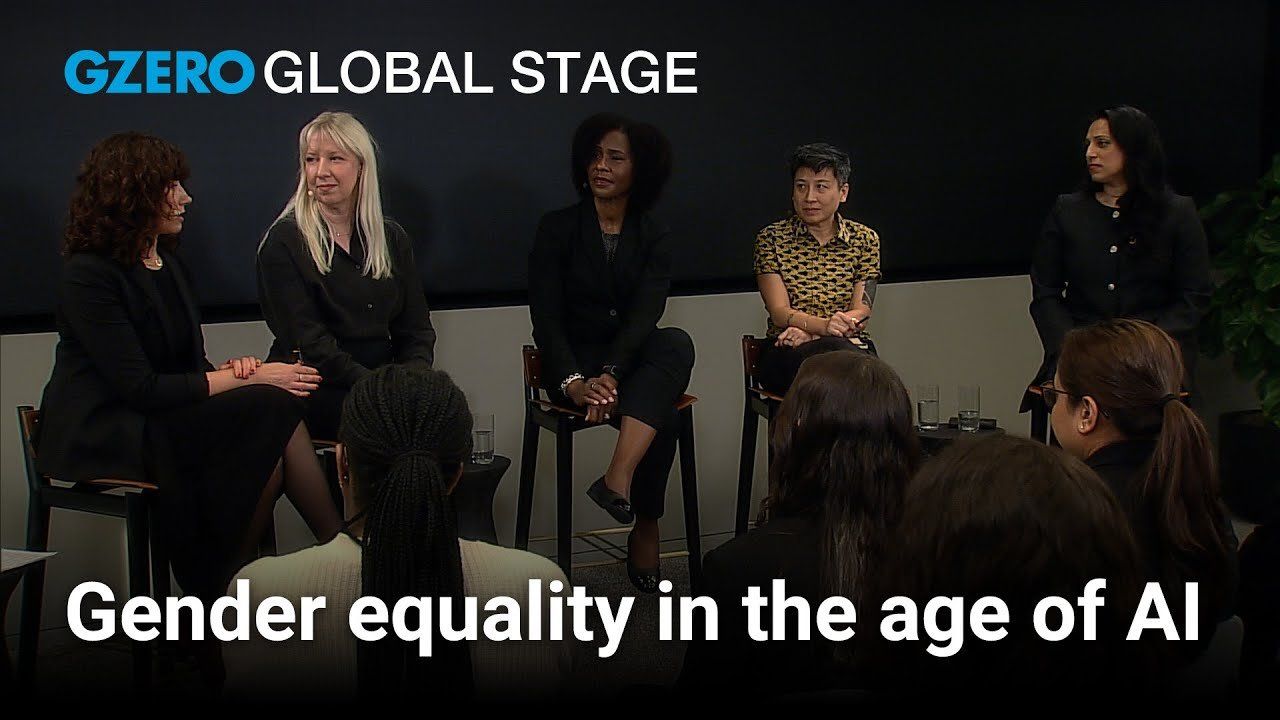Commission on the Status of Women
What impact will AI have on gender equality?

What impact will AI have on gender equality? | Global Stage | GZERO Media

At the current rate of progress toward gender equality, the World Economic Forum estimates it will take 131 years for women to attain parity in income, status, and leadership.
While technology is a powerful tool to help close the gender gap, it can also be weaponized. GZERO’s special presentation “Gender Equality in the Age of AI” featured candid conversations about the opportunities and threats that exist online, and how artificial intelligence will impact them.
Produced on the sidelines of the 68th United Nations Commission on the Status of Women, the program featured leading experts from government, technology, and philanthropy. Moderator Penny Abeywardena, former NYC Commissioner for International Affairs, was joined by Jac sm Kee, co-founder of Numun Fund; Vickie Robinson, general manager of the Microsoft Airband Initiative; Michelle Milford Morse, the United Nations Foundation’s vice president for Girls and Women Strategy; and Lucia Ďuriš Nicholsonová, a member of the European Parliament from Slovakia.
“The beauty and the promise of digital technologies is the opening up of democratic and civic participation space,” said Jac sm Kee. “But what is happening right now is the direct closing down of these spaces through deliberate attacks.”
The discussion focused on three key areas: gender-based online violence, the need for greater digital inclusion and access, and increasing leadership roles for women in all aspects of public life.
In a recent study from UNESCO, 58% of women and girls surveyed globally said they had experienced online violence, defined as a range of abuses including harassment, stalking, and defamation. Female journalists and politicians experienced these threats in even higher numbers.
During GZERO’s program, European Union parliamentarian Lucia Ďuriš Nicholsonová shared incredibly disturbing messages she has received throughout her years in office, many including violent and profane language and graphic sexual threats.
“These words are real. The people who are writing these words are real,” Nicholsonová said. “We can erase them through algorithms online, but they will still exist. I think we really need to know what is out there because it's a real threat.”
Michelle Milford Morse of UN Foundation explained to the crowd gathered at the NYC event that these kinds of abuses have compounding impacts on victims. “More than half of young women are experiencing some form of abuse and harassment online, sometimes as young as eight,” she said. “I don't think that we're thinking enough about the accumulation of that over time and the real harm to their mental health.”
But technology, when used for good, is also a powerful tool that can help close the gender gap. Microsoft’s Vickie Robinson described the importance of connectivity and digital skills. Of the estimated 2.6 billion people worldwide who lack internet access, the majority are women and girls.
“It's critically important, now more than ever, we need to make sure that we close the digital divide once and for all, but that we bring along with that the skills, we make it affordable, we make it accessible,” Robinson said.
The conversation then turned to leadership, and the need for more women in positions of authority in all industries and sectors of public life.
“Parliaments and legislators that have more women, they prioritize social services for children and the most vulnerable. When they engage in peace agreements, those peace agreements last longer. They're more likely to protect biodiversity,” said Morse. “There is no argument for half our human family to be shut out of society.”
The program was part of the Global Stage series and produced by GZERO in partnership with Microsoft and the United Nations Foundation. The series features politicians, private sector leaders, and renowned experts in conversation about issues at the intersection of technology, geopolitics and society.
As more small businesses move sales, payments, and customer relationships online, they unlock new opportunities, but they also become easier targets for cyber-criminals and other threat actors.
Chris, an Army veteran, started his Walmart journey over 25 years ago as an hourly associate. Today, he manages a Distribution Center and serves as a mentor, helping others navigate their own paths to success. At Walmart, associates have the opportunity to take advantage of the pathways, perks, and pay that come with the job — with or without a college degree. In fact, more than 75% of Walmart management started as hourly associates. Learn more about how over 130,000 associates were promoted into roles of greater responsibility and higher pay in FY25.
Tune in on Saturday, February 14th at 12pm ET/6pm CET for the live premiere of our Global Stage from the 2026 Munich Security Conference, where our panel of experts takes aim at the latest global security challenges.
Microsoft unveiled a new set of commitments guiding its community‑first approach to AI infrastructure development. The strategy focuses on energy affordability, water efficiency, job creation, local investment, and AI‑driven skilling. As demand for digital infrastructure accelerates, the company is pushing a new model for responsible datacenter growth — one built on sustainability, economic mobility, and long‑term partnership with the communities that host it. The move signals how AI infrastructure is reshaping local economies and what people expect from the tech shaping their future. Read the full blog here.